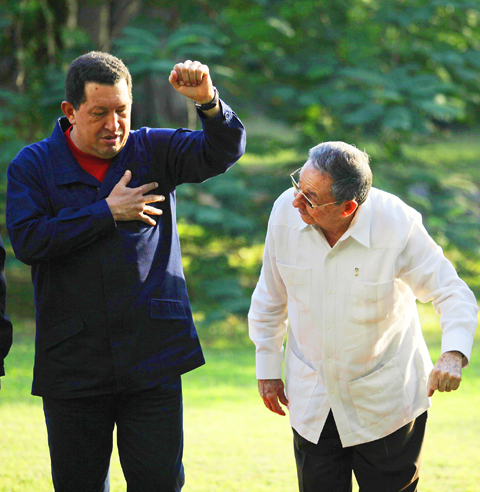Venezuelan President Hugo Chavez on Sunday rejected US “threats” on the consequences of Latin American ties with Iran, blasting US Secretary of State Hillary Clinton’s remarks as an “imperial offensive.”
“Mrs Clinton’s statements [are] like a threat above all against Venezuela and Bolivia ... They are the clear signs of an imperial offensive seeking to stop the advancement of progressive forces and regain its back yard,” Chavez told reporters in Havana.
The firebrand leftist leader, long a thorn in Washington’s side, made his comments at a summit of the Bolivarian Alliance of the Americas in Cuba.

PHOTO: REUTERS
Clinton warned Latin American countries on Friday to “think twice” about fostering ties with Iran because of its alleged support for terror amid the Islamic republic’s growing presence and warming relations in the region.
“I think if people want to flirt with Iran, they should take a look at what the consequences might well be for them. And we hope that they will think twice and we will support them if they do,” she said during a question-and-answer session at the US Department of State’s public policy forum on Latin America.
“We hope that there will be a recognition that this is the major supporter, promoter and exporter of terrorism in the world today,” she said, calling it a “very bad idea for the countries involved” to allow Iran to gain a foothold in the region.

PHOTO: EPA
Western powers have been at loggerheads with Iran over its nuclear program for years, claiming Tehran is covering up an effort to develop nuclear weapons, while the Islamic republic claims it is simply developing nuclear energy for peaceful, civilian purposes.
In a sign of Iran’s push for closer ties with the mostly leftist governments thriving at the doorstep of the US, Iranian President Mahmoud Ahmadinejad visited Venezuela, Bolivia and Brazil last month.
In May, Clinton defended moves by President Barack Obama’s administration to engage anti-US leaders in Latin America as a way to check what she called “disturbing” Iranian and Chinese inroads in the region.
Clinton said Obama had to take a new tack after his predecessor George W. Bush’s efforts to isolate such leaders had only made them “more negative” toward Washington and more receptive to rival powers.
In “a multipolar world where we are competing for attention and relationships with at least the Russians, the Chinese, the Iranians,” such countries can fill the void left by the lack of US engagement, she warned at the time.

Airlines in Australia, Hong Kong, India, Malaysia and Singapore yesterday canceled flights to and from the Indonesian island of Bali, after a nearby volcano catapulted an ash tower into the sky. Australia’s Jetstar, Qantas and Virgin Australia all grounded flights after Mount Lewotobi Laki-Laki on Flores island spewed a 9km tower a day earlier. Malaysia Airlines, AirAsia, India’s IndiGo and Singapore’s Scoot also listed flights as canceled. “Volcanic ash poses a significant threat to safe operations of the aircraft in the vicinity of volcanic clouds,” AirAsia said as it announced several cancelations. Multiple eruptions from the 1,703m twin-peaked volcano in

Chinese President Xi Jinping (習近平) launched a week-long diplomatic blitz of South America on Thursday by inaugurating a massive deep-water port in Peru, a US$1.3 billion investment by Beijing as it seeks to expand trade and influence on the continent. With China’s demand for agricultural goods and metals from Latin America growing, Xi will participate in the APEC summit in Lima then head to the Group of 20 summit in Rio de Janeiro next week, where he will also make a state visit to Brazil. Xi and Peruvian President Dina Boluarte participated on Thursday by video link in the opening

China has built a land-based prototype nuclear reactor for a large surface warship, in the clearest sign yet Beijing is advancing toward producing the nation’s first nuclear-powered aircraft carrier, according to a new analysis of satellite imagery and Chinese government documents provided to The Associated Press. There have long been rumors that China is planning to build a nuclear-powered aircraft carrier, but the research by the Middlebury Institute of International Studies in California is the first to confirm it is working on a nuclear-powered propulsion system for a carrier-sized surface warship. Why is China’s pursuit of nuclear-powered carriers significant? China’s navy is already

IT’S A DEAL? Including the phrase ‘overlapping claims’ in a Chinese-Indonesian joint statement over the weekend puts Jakarta’s national interests at risk, critics say Indonesia yesterday said it does not recognize China’s claims over the South China Sea, despite signing a maritime development deal with Beijing, as some analysts warned the pact risked compromising its sovereign rights. Beijing has long clashed with Southeast Asian neighbors over the South China Sea, which it claims almost in its entirety, based on a “nine-dash line” on its maps that cuts into the exclusive economic zones (EEZ) of several countries. Joint agreements with China in the strategic waterway have been sensitive for years, with some nations wary of deals they fear could be interpreted as legitimizing Beijing’s vast claims. In 2016,